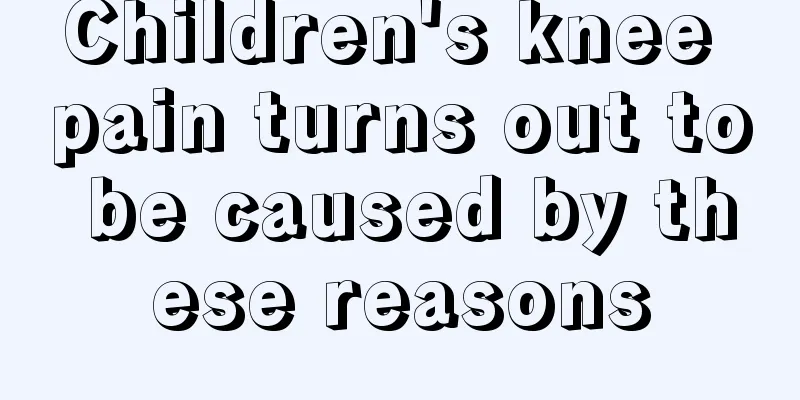Children's knee pain turns out to be caused by these reasons

|
Knee pain is common in middle-aged and elderly people, so parents will be very worried when their children have knee pain, not knowing what causes it. In fact, rheumatic fever, rheumatoid arthritis, allergic purpura arthritis, acute suppurative arthritis, acute hip synovitis, growing pains and other causes can cause knee pain in children. Parents need to understand them one by one, treat them in time, and let their children recover as soon as possible. 1. Rheumatic fever It can easily cause pain in large joints such as the ankles, knees, hips, wrists, elbows, and shoulders, that is, rheumatoid arthritis, which may be accompanied by varying degrees of joint swelling and tenderness. The pain is short-lived and sometimes subsides in just 1 to 2 days. If parents pay attention to it, rheumatic fever can spread to the heart and cause rheumatic heart disease. 2. Rheumatoid arthritis Most cases occur between the ages of 4 and 10. The disease can be acute, with symptoms such as fever and joint pain; it can also be chronic. This disease can cause sudden fever and accelerate the disease progression, eventually invading joints throughout the body and causing joint deformities. 3. Henoch-Schonlein purpura arthritis Clinically, it is common to see swelling and pain in one or more joints, and purpura on the skin. In a few cases, purpura occurs from time to time, so it is easy to be ignored. If not treated in time, it may cause kidney damage. 4. Acute septic arthritis It is more common in infants and young children, sometimes secondary to injury or other infectious diseases. The onset is acute, with one or more joints becoming red, swollen and painful, accompanied by symptoms such as fever, irritability, and loss of appetite. 5. Acute synovitis of the hip Most of the children are 3 to 10 years old, and often have a history of upper respiratory tract infection 2 to 3 weeks before the onset of the disease. The main symptom is mild pain in one thigh and knee joint. The pain worsens during movement and the child may limp. The disease heals on its own after 3 to 4 weeks. 6. other Autoimmune diseases such as systemic lupus erythematosus and mixed connective tissue disease; infectious diseases such as tuberculous osteoarthritis; some malignant diseases such as leukemia are also closely related to joint pain. 7. Growing pains: Children grow very fast during this period, and can grow 7-8 cm each year. Because bones grow rapidly, while the surrounding nerves, tendons, and muscles grow relatively slowly, pulling pain will occur. In short, children's joint pain cannot be ignored, and growing pains can only be considered after the cause of the disease is ruled out. Growing pains are mostly related to insufficient calcium intake in the diet, and the symptoms can often be relieved by calcium supplementation. |
<<: What should I do if my child has a stuffy nose? Tips for solving children's nasal congestion
>>: What to do if children have toothache?
Recommend
How much water should a three-month-old baby drink every day?
The body of a baby is very fragile, and its resis...
Red blood clots in newborn's eyes
If there are red blood clots in the eyes of a new...
What are the developmental standards for babies over 9 months old?
For parents, the baby's growth day by day is ...
Children should supplement nine nutrients when exercising
Many children like to do sports, and they usually...
Recipe for one-year-old baby
When the baby is about one year old, some food ne...
How to quickly strengthen your baby's physique
Many babies are particularly prone to illness bec...
What are some tips for getting your baby to sleep?
Babies have irregular sleep patterns, especially ...
What is the most effective way to stop vomiting in children?
It is inevitable that people will vomit in their ...
The baby has only one tooth on top
Generally speaking, our teeth grow in a certain o...
What should babies eat to strengthen their spleen and stomach?
Children's spleen and stomach are very fragil...
Why do children often have numb feet?
In our daily lives, we often encounter limb numbn...
3-year-old baby height and weight
When the baby reaches the age of three, his weigh...
How to read the urine volume bar on diapers
When a baby is just born, he has no consciousness...
How to treat black teeth in a 1-year-old baby
Many babies have black teeth, which seriously aff...
Treatment of red pimples on children's body
Nowadays, it is not uncommon for children to have...









